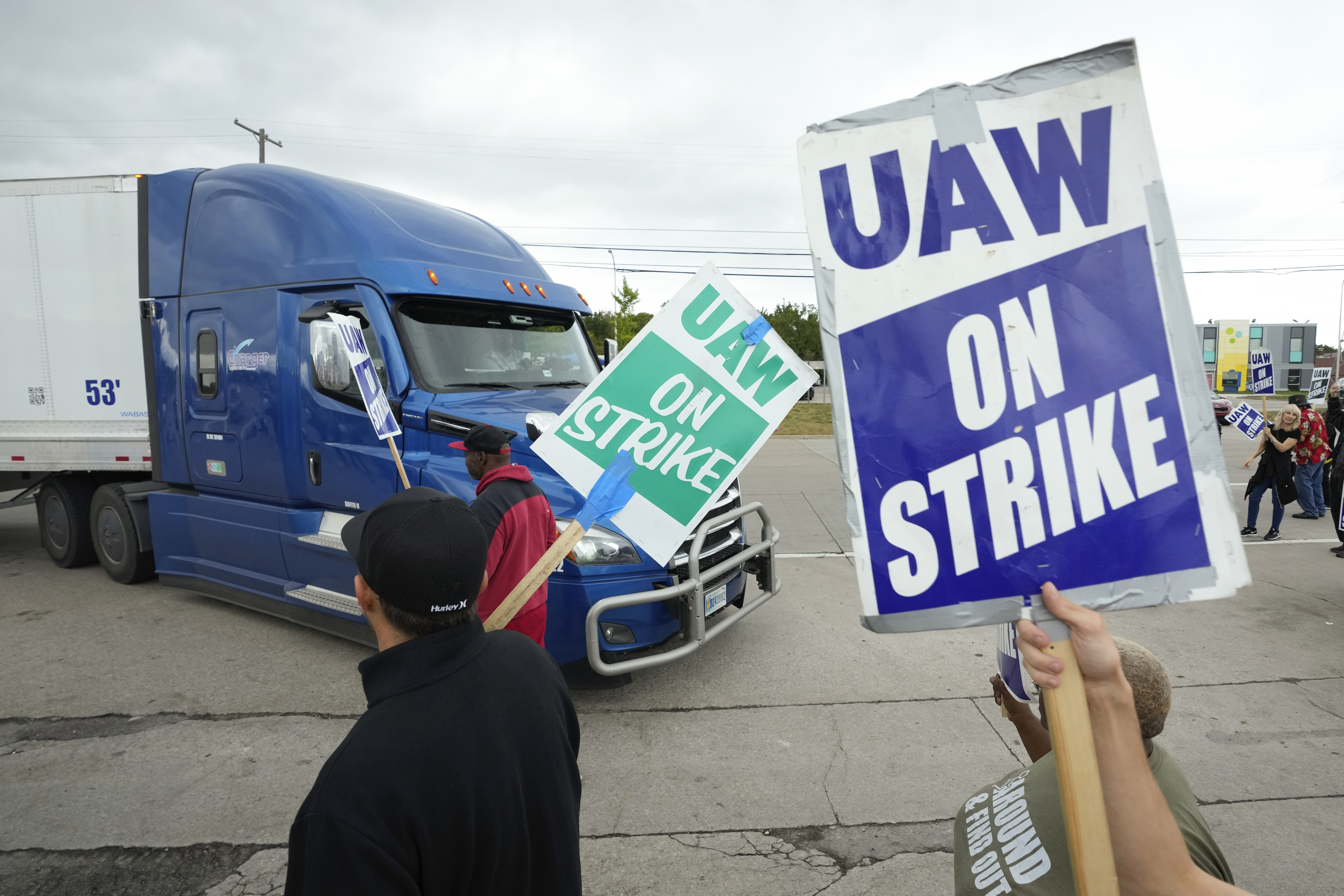UAW announces more walkouts at Ford, GM
The union spared Stellantis, with UAW President Shawn Fain citing some progress in talks with that company.


UAW President Shawn Fain said Friday 7,000 workers will walk out at a Ford facility in Chicago and a GM plant in Lansing, Mich., again expanding its strike against the automakers, while one of the targeted companies blamed the union's stance on electric vehicle production for stalling negotiations.
The union spared Stellantis from this round of expanded work stoppages, with Fain citing some progress in talks.
The strike expansion will add further pressure on the car companies and comes days after both President Joe Biden and his predecessor, former President Donald Trump, traveled to Michigan to court the support of blue-collar workers, a key political constituency ahead of the 2024 elections.
“Without the strike weapon, the war on workers is a rigged fight,” Fain said Friday.
The additional workers called to strike are based at Ford’s Chicago Assembly Plant and GM’s Lansing Delta Township plant in Michigan, bringing the total number of plants on strike to 43.
Some 25,000 of the UAW’s nearly 150,000 members at the Big Three will now be on strike. Friday's move marks the second week in a row of a relatively small expansion, keeping the door open to a more extensive walkout or a full-on strike of all UAW workers at all three major Detroit carmakers.
Last week the union targeted more than three dozen auto parts distribution centers operated by the GM and Stellantis — while sparing Ford, which Fain said had been making progress in negotiations.
This week, Stellantis got the break.
"Moments before this broadcast, Stellantis made significant progress on the 2009 cost-of- living allowance, the right to not cross a picket line, as well as the right to strike over product commitments, plant closures and outsourcing moratoriums," Fain said Friday on Facebook, referring to the COLAs suspended in 2009 and other key union demands.
"We are excited about this momentum at Stellantis and hope it continues," he said.
Ford CEO Jim Farley on Friday afternoon blamed the UAW's concerns over battery plants and the electric vehicle transition for holding up negotiations.
“I believe we could have reached a deal on pay and benefits, but so far I believe the UAW is holding the deal hostage over battery plants," Farley said.
The issue "generally speaking" is that the union wants battery plants to be covered by the master labor agreement, Farley said, though he declined to provide specifics.
He argued the strikes were "premeditated," adding, "We believe the UAW is holding up a deal over battery plants that won’t come online for 2 to 3 years.”
The UAW disputed those characterizations, calling them a misrepresentation of what's happening at the bargaining table. UAW and Ford still have economic disagreements outside of EVs, including on retirement issues, Fain said in a statement later Friday.
The issue of the electric vehicle transition — backed by Biden, other Democrats and environmentalists — has been in the background since the beginning of negotiations. The union has expressed concern that organized labor and high-paying auto jobs could be left behind in the transition to clean energy.
One issue the UAW has zeroed in on: joint ventures between the Big Three and battery makers, where workers may not be covered by the same protections as traditional autoworkers.
They've so far withheld an endorsement of Biden, citing concerns over the EV transition, despite Biden's otherwise historic support for their strike. The administration has previously stressed that battery factory workers have the right to organize for pay and protections.
Gerald Johnson, GM's executive vice president of global manufacturing, said in a statement the company has "not received a comprehensive counteroffer from UAW leadership" for an offer presented Sept. 21.
"Calling more strikes is just for the headlines, not real progress. The number of people negatively impacted by these strikes is growing and includes our customers who buy and love the products we build," Johnson said.
Gaps remain in Stellantis' negotiations with the union, even as the company has been "intensely working" to come to an agreement, company spokesperson Jodi Tinson said.
GM is now the only company to have been targeted in all three weeks of the strike.
Negotiations have not broken down with any of the three companies, Fain said.
But the walkout expansion means the strike will continue to dog Biden politically, as its economic impact grows and Republicans try to keep the spotlight on the administration's push to expand electric vehicle production.
Biden trod new ground in the U.S. presidency on Tuesday by becoming the first sitting president to walk a picket line. The unprecedented step demonstrated the White House’s commitment to backing up Biden’s claims to be the most pro-union president in a century.
It was also a coup for the UAW’s Fain, who had coaxed Biden out to Michigan after spurning some of the administration’s more incremental offers to help and calling on the president to go all-out to show solidarity with workers.
"The most powerful man in the world showed up for one reason only: because our solidarity is the most powerful force in the world," Fain said Friday.
Fain’s unconventional approach has kept automakers on the defensive, and the UAW’s stair-step strike tactic has landed blows to the car companies while preserving much of the union’s funds to assist workers on the picket line. The UAW has demanded generational leaps in pay raises and sought to claw back concessions made over a decade ago, when the industry was laid low by the nation’s financial crisis.
At the same time, Trump has tried to cleave a wedge between the UAW’s leadership and its rank-and-file membership. The former president blasted Biden’s push to increase adoption of electric vehicles and slammed the UAW for not endorsing his bid to return to the White House, but went to a non-union manufacturing plant in Michigan’s Macomb County to deliver that message.
“It doesn’t make a damn bit of difference what you get because in two years you’re all going to be out of business,” Trump said Wednesday. “You’re not getting anything.”
Trump has tried to claim the mantle of the savior of blue-collar workers, though his previous administration repeatedly weakened unions’ power — in both the public and private sectors — and loosened the reins on employers who violate workplace safety standards or exploit employees.
The strike began on Sept. 15 when roughly 12,700 UAW members walked off the job at Ford, GM and Stellantis, targeting a single manufacturing plant at each company simultaneously, a novel tactic.
Fain on Friday said workers are in a "war of the working class versus corporate greed."
"We are the new arsenal of democracy," he said, invoking a phrase coined by President Franklin Roosevelt in 1940, the year before the U.S. entered World War II. "The workers are the liberators."












